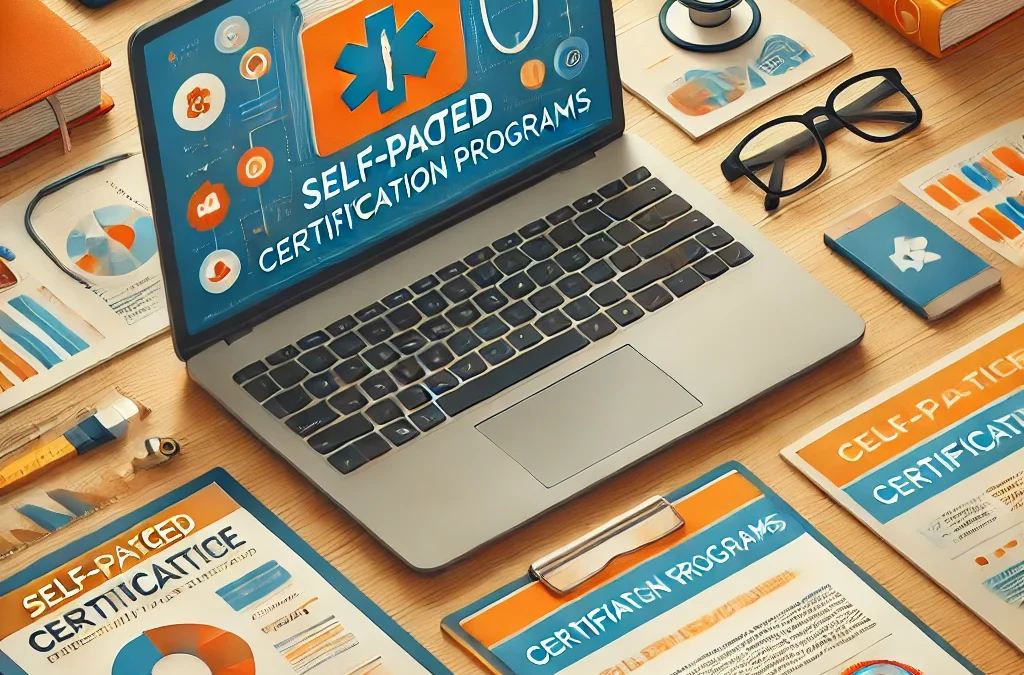Self-paced Healthcare Certification Programs
Self-paced healthcare certification programs offer the flexibility to learn at your own pace and schedule. These programs are ideal for
those juggling work, family, or other commitments while pursuing a career in healthcare.
Introduction to Self-paced Learning
Self-paced learning allows you to study whenever it fits into your schedule, without the pressure of rigid deadlines. This flexibility
makes healthcare certifications more accessible to busy individuals.
Popular Self-paced Healthcare Certification Programs
- CNA Certification: Prepares you for entry-level patient care roles.
- Medical Billing and Coding: Opens doors to healthcare administration jobs.
- CPR and First Aid Certification: A must-have for many healthcare professionals.
Online Platforms Offering Self-paced Certifications
- Explore platforms like Coursera, edX, and AAPC for flexible programs.
- Many community colleges also offer self-paced healthcare courses.
Advantages of Self-paced Healthcare Programs
- Study at your own pace, balancing education with other responsibilities.
- Enjoy the flexibility to start and pause whenever necessary.
Key Features of Self-paced Programs
- Access learning materials 24/7.
- Engage with instructors and peers through online forums.
Steps to Enroll in a Self-paced Healthcare Program
- Choose a program that aligns with your career goals.
- Complete the registration process and set up your account.
Tips for Success in Self-paced Programs
- Set clear goals to track your progress.
- Create a study schedule and stick to it.
Cost of Self-paced Healthcare Certifications
- Tuition fees vary but many programs offer payment plans.
- Explore scholarships and financial aid options.
Preparing for Certification Exams
Use study guides and practice tests to prepare for exams. Manage your time effectively during the test to ensure success.
Career Opportunities with Self-paced Certifications
- Find jobs in hospitals, clinics, or insurance companies.
- Explore remote work opportunities in healthcare administration.
Tools and Resources for Self-paced Learning
- Use flashcard apps and join webinars to enhance your learning.
- Practice with online coding platforms and healthcare software.
Overcoming Challenges in Self-paced Programs
- Avoid procrastination by setting deadlines for yourself.
- Seek support from instructors or peers when needed.
Continuing Education After Certification
Earn CEUs to renew your certifications and stay updated with industry trends. Explore advanced certifications to further your career.
Conclusion – Take Charge of Your Healthcare Career with Self-paced Programs
Self-paced healthcare certification programs provide the flexibility to learn at your own pace while gaining the skills needed to
succeed in the healthcare industry. Choose the right program today and take the first step towards a rewarding career.
FAQs
How long do self-paced programs take to complete?
Most programs take between 3 to 12 months, depending on your pace.
Can I access instructor support in self-paced courses?
Yes, many programs offer access to instructors and peer forums.
Are self-paced programs more affordable than traditional ones?
Yes, they often have lower tuition and fewer additional expenses.
Can I get a job after completing a self-paced certification?
Yes, many employers accept certifications from self-paced programs.
Are self-paced programs available for beginners?
Yes, many programs are designed for individuals new to healthcare.


Recent Comments